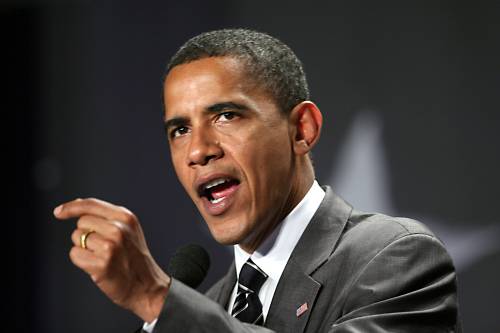Obama’s Call for Sacrifice
In a stark departure from the current White House, the president-elect warns of hard choices ahead as U.S. seeks to pull back from financial disaster. After short-term spending to right the economy, Obama looks to long-term spending cuts.
Jul 31, 2020112.2K Shares1.8M Views
Sen. Barack Obama (WDCpix)
Just two days before Americans sit down to Thanksgiving tables spilling with excess, President-elect Barack Obama is asking the country for something far different: economic sacrifice in the face of a deepening financial mess.
The call comes as Obama continues to introduce the members of his financial team, who have the unenviable task of leading the country out of the economic crisis. That process, Obama said, will involve immediate spending on state-run public works projects, health-care modernization and green energy once he takes office on Jan. 20. This would be followed by a long-term effort to cut federal spending by eliminating waste. Some federal programs, the president-elect warned with few specifics, could disappear along the way.
Illustration by: Matt Mahurin
“If we are going to make the investments we need,” Obama told reporters at a press conference Tuesday in Chicago, “we also have to be willing to shed the spending that we don’t need.”
If the message sounds strange coming from the White House — that’s because it isn’t. But Obama acknowledges that he has had to step boldly into the public arena during the transition. He is trying to fill the vacuum created by a White House that has grown all but irrelevant in the face of public distrust and the dire financial crisis.
Obama’s call for sacrifice marks a stark departure from the White House message over the last eight years.
Since 2001, President George W. Bush has encouragedAmericans to fly to Disney World in response to the tragedy of 9/11; urged the publicto “go shopping more” even as individual debt soared, and cut taxes for the wealthiest citizens while national deficits ballooned and debt doubled into the double-digit trillions. The message under the current administration was as consistent as it was clear: The public will be asked to sacrifice nothing, even if it means the degradation of the country’s economic viability.
It wasn’t always this way. In an April 1942 speech, President Franklin D. Roosevelt outlined his “seven-point program” of economic survival as the nation sought to weather its entrance into World War II. Roosevelt talked about raising taxes, limiting corporate profits and rationing commodities.
“Some people are already taking the position that every one of the seven points is correct except the one point which steps on their own individual toes,” Roosevelt said. “The blunt fact is that every single person in the United States is going to be affected by this program.”
Similarly, the subtext of Obama’s message Tuesday seems intended to prepare Americans for lean times ahead — in both the public and private spheres. While the president-elect reiterated his plan to install middle-class tax cuts, he also said he intends to trim some popular federal programs.
“We’re still going to have to make some tough choices,” he said. “There are just going to be some programs that simply don’t work, and we’ve got to eliminate them.”
Obama pointed specifically to controversial subsidies to wealthy farmers as “a prime example of the kind of waste that I intend to end as president.” Bolstering his cause, the Government Accountability Office issued a report yesterday revealingthat more than 2,700 individuals receiving $49 million in federal farm subsidies in recent years earned more than the $2.5 million that should have made them ineligible for the program.
Another item that Democrats — including Obama — have had on the chopping block is Medicare Advantage, a program that allows seniors to get health-care coverage through private insurers. Recent studies have shownthat those plans cost taxpayers more with little health benefit. Still, the program has been enormously popular: more than 10 million patients — almost a quarter of the Medicare population — participate.
Helping the new administration will be Peter Orszag, whom Obama nominated Tuesday as director of his Office of Management and Budget. Orszag, who has headed the Congressional Budget Office since the start of 2007, has long advised Washington policy-makers on the need to rein in federal spending, particularly when it comes to health-care programs like Medicare and Medicaid.
“Peter doesn’t need a map to tell him where the bodies are buried in the federal budget,” Obama said. “He knows what works and what doesn’t.”
Cutting budgets, however, won’t be easily. Even the most unnecessary federal spending usually has jobs tied to it — not to mention lobbyists and congressional defenders. Indeed, Bush vetoedCongress’s $300 billion farm billin May, citing the same subsidies to wealthy farmers that Obama decried Tuesday. Lawmakers from both both parties and all ideologies came together to override it.
Still, for some in Congress, Obama’s words are a welcome change to the politics-as-usual message that’s dominated Washington policy-making for the past eight years. Budget hawks in particular applauded his belt-tightening vows.
“For too many years, Washington has lived a fantasy, putting our national priorities on a credit card from the bank of China,” Rep. Jim Cooper (D-Tenn.), a prominent member of the House Blue Dog Coalition, said in a statement Tuesday. “We don’t have that luxury anymore.”
Washington observers have wondered how Obama’s stimulus plans would fly among the Blue Dogs, a group of fiscally conservative Democrats who now number more than 50. But Cooper, who had been regarded as a potential pick to head Obama’s Office of Management and Budget, conceded the need for short-term borrowing as long as it’s followed by long-term fiscal discipline. “We’ve made trillions of dollars of promises to our children and grandchildren that we can’t keep,” Cooper said. “Obama serves our country well by calling on us to sacrifice today so that tomorrow can be better.”
A glance at the country’s spending obligationsindicates that it’s probably in Obama’s best interest to rein in deficit spending. With the national debt topping $10 trillion this year, lawmakers are forced to spend close to $250 billion annually just to pay off the interest. That’s $250 billion the federal government doesn’t have to fund infrastructure projects, health-care fixes and the myriad other reforms that need addressing. The solution has been to borrow the difference, which adds to the debt, exacerbating the problem.
Before trimming deficits, however, the new president will first have to tackle the economic crisis. On Tuesday, Obama indicated that some of the new stimulus package could provide infrastructure funding to states that are strapped for cash and slashing programs as a result. Obama said he wants to “see what projects are already being undertaken by state and local governments. and making sure that they have the funds to continue those projects.”
The states are more than willing to comply. New Jersey Gov. Jon Corzine (D), for example, told House lawmakersthis month that his state has roughly $1.5 billion in projects ready to launch within 90 days. In Rhode Island, tied with Michigan for the highest unemploymentin the country, there are roughly $57 millionin similar projects set to start immediately, according to Sen. Sheldon Whitehouse (D-R.I.).
Obama on Tuesday was quick to downplay the significance of his recent appointments and public statements, saying they were intended merely to lend Americans a sense “that we don’t intend to stumble into the next administration.”
Ironically, that lack of leadership could benefit Obama in January as he fights to install this enormous reform platform.
“I don’t think that there’s any question that we have a mandate to move the country in a new direction,” Obama said.

Rhyley Carney
Reviewer
Latest Articles
Popular Articles

